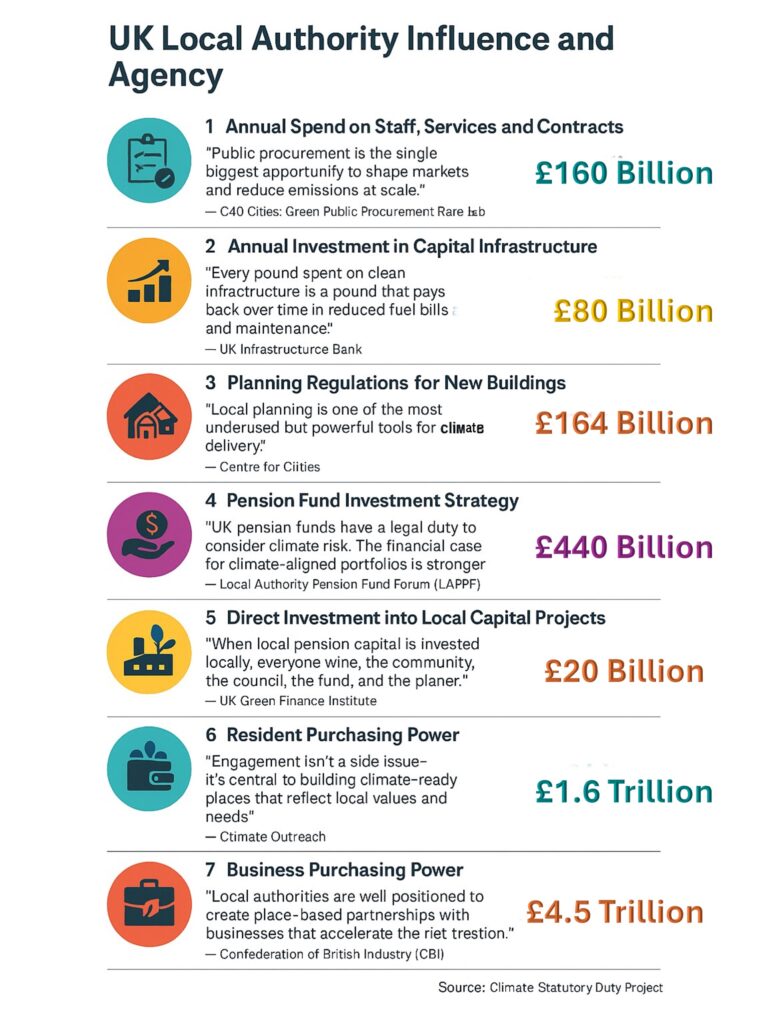

This article explores the immense power, influence and reach of Local authorities through Statutory Duties, Discretionary Powers and the Agency of its connections. With our article, "The Leadership Dividend: How Local Authority Economic Power Can Deliver Net Zero and Resilient Prosperity", we conclude that the power, influence, reach and economic leverage of local authorities are probably the only way the UK can achieve it's obligations under the Paris 2015 Accord to limit global increases in temperature to +1.5C
We want your input into designing a Climate Statutory Duty for Local Authorities and Public Bodies that, once enacted into law, would drive achievement.
Once you have read these articles, please complete Question 1 and Question 2 on page "Shaping the Climate Statutory Duty" .
Your input will help design a law that will
Our future is in our collectives hands to please help us define that future by responding to the questions on page "Shaping the Climate Statutory Duty"
in the UK possess substantial, multifaceted power to shape outcomes across society, economy, and the environment. As democratically accountable institutions with statutory responsibilities and discretionary freedoms, they have unique agency to influence behaviour, infrastructure, investment, and social norms at the local level.
This article explores the full spectrum of that power—from their legal duties and policy levers to their broader capacity for leadership and coordination. It invites readers to consider how a proposed Climate Statutory Duty for local authorities could harness this power to accelerate the UK’s path to net zero and long-term resilience.
Imagine a world where every individual and every business consciously worked toward zero carbon emissions — with the shared ambition of staying within the 1.5°C Paris Agreement threshold.
Such a transformation would deliver a healthier, safer, and more resilient society for all, preserving the natural systems that sustain us.
But this raises the crucial question: who can mobilise every person and business toward that vision?
I argue that local authorities are uniquely placed to be the key agents of change. They have a direct, place-based relationship with every resident and enterprise in their area. They are connected to central government and public services, and operate in networks that include suppliers, investors, landowners, civil society and beyond.
This piece explores the full extent of local government power, reach, and influence — before asking what climate breakdown requires of these vital democratic institutions.
Local authorities in the UK hold extraordinary economic leverage. Individually and collectively, they can influence how people live, travel, build, and buy — shaping both local markets and social norms.
When considered as a whole, the scale is striking:

As economic actors, councils are not just administrators — they are market shapers. Their spending and decisions ripple out across supply chains, local economies, and social priorities.
For a deeper dive into this potential, see “The Leadership Dividend: How Local Authority Economic Power Can Deliver Net Zero and Resilient Prosperity.”
So local authorities have immense economic power but let's put this into perspective and explore their reach.
Statutory duties are the legal responsibilities that local authorities must fulfil. These are defined in legislation and form the backbone of public service delivery — from safeguarding vulnerable children to ensuring clean streets and collecting waste.
| Area | Duty | Legal Basis |
| Children’s Services | Protect and promote the welfare of children | Children Act 1989, 2004 |
| Adult Social Care | Assess and meet eligible care needs for adults | Care Act 2014 |
| Public Health | Deliver services to improve health and reduce inequalities | Health and Social Care Act 2012 |
| Housing | Prevent homelessness, ensure housing standards | Housing Act 1996, Homelessness Reduction Act 2017 |
| Education | Provide access to schooling and ensure attendance | Education Acts 1996, 2002, 2011 |
| Environmental Health | Monitor pollution and public health risks | Environmental Protection Act 1990, Public Health Acts |
| Planning | Make Local Plans, control development | Town and Country Planning Act 1990; PCPA 2004 |
| Licensing | Manage alcohol, gambling, taxi and business licences | Licensing Act 2003, Gambling Act 2005 |
| Civil Protection | Prepare and respond to local emergencies | Civil Contingencies Act 2004 |
| Pensions | Administer the Local Government Pension Scheme | Public Service Pensions Act 2013; LGPS Regulations |
Discretionary powers enable councils to go beyond the statutory minimum — to shape local priorities, champion local values, and lead change.
These powers often underpin the most visible, loved, and innovative aspects of local government, including environmental leadership and community regeneration.
| Area | Discretionary Action | Legal Basis |
| Culture & Leisure | Operate parks, libraries, museums, and community venues | Local Government Act 1972 |
| Climate Action | Declare climate emergencies, lead net-zero strategies | Localism Act 2011 |
| Transport Initiatives | Support active travel, subsidise bus services | Transport Act 1985 |
| Youth & Community | Run youth services, issue local grants | Education and Inspections Act 2006 |
| Affordable Housing | Build or invest in non-statutory housing schemes | Housing Acts |
| Economic Development | Support businesses, develop enterprise zones | Local Government Act 2000 |
| Neighbourhood Planning | Help communities develop local plans | Localism Act 2011 |
| Environmental Projects | Promote rewilding, tree planting, biodiversity efforts | Environment Act 2021 |
A local authority’s agency goes beyond duties and powers — it’s about its ability to lead, connect, and drive change across systems. Councils are not just service providers; they are convenors, employers, storytellers, and democratic institutions.
Here are five dimensions of that agency:
| Type of Agency | What It Enables | Category |
| Legal & Political | Make local rules, enforce standards, use general powers | Governance & Legal Duties |
| Economic | Shape local markets through procurement, investment, and land use | Economy & Regeneration |
| Relational | Build cross-sector partnerships and collaborate across institutions | Community & Partnerships |
| Moral & Narrative | Declare priorities, lead local conversations, embody public values | Leadership & Values |
| Systemic | Coordinate across policy silos to solve complex challenges | Governance & Strategy |
Councils don’t just deliver change — they can orchestrate it.
So, local authorities already hold the legal mandates, economic levers, and democratic legitimacy to lead on climate action. But without a clear statutory duty to act—and without unlocking the full potential of their agency—the UK risks missing out on its most powerful climate delivery mechanism.
The economic power of this influence of even a small local authority is worth around £15Bn even for a small local authority like Windsor & Maidenhead, and is discussed in our article, "The Leadership Dividend: How Local Authority Economic Power Can Deliver Net Zero and Resilient Prosperity".
Imagine what power your local authority has if only we could influence it.
This article is an open invitation to co-create a bold and practical vision for a Climate Statutory Duty—one that aligns legal responsibility with climate necessity, and empowers councils to protect communities, transform places, and drive a just transition.
We believe the full power of local authorities—spanning statutory functions, discretionary capabilities, and real-world agency—must be mobilised to meet the climate challenge.
We’re inviting practitioners, policymakers, community leaders, and citizens to reflect on and respond to this key question:
Please also highlight any current hurdles, barriers or legal constraints that need to be addressed to fully unlock this potential.
Your insights will help shape the next phase of this work and build a stronger case for national policy that truly empowers local action.
Once we understand the full extent of local authority power, we must discuss and respond to the question: what should a Climate Statutory Duty require or enable councils to do? - Question 1
This next phase in the workflow focuses on defining the critical issues that a Climate Statutory Duty must address to drive transformative climate action at the local level.

Wisdom’s LinkedIn profile indicates that he is an Accountant, Corporate Treasurer, Politician, Activist locally and with Climate Change. He has spent time as a Trustee of a number of different DB, DC and LGPS Funds and currently on the Commercial Advisory Board of the Local Government Association. He is a Councillor in Windsor at the Royal Borough of Windsor and Maidenhead.
Achieving Maximum Impact on Net Zero
Tell us your views on "How Local Authorities Can Achieve Maximum Impact on Net Zero?" - Click and respond to Question 1 on this page
Issues that should be addressed
Tell us your views on "What Critical Issues a Climate Statutory Duty Should Address?" - Scroll down page to Question 2
Creating solution for local authorities
We want to create solutions for local authorities. Tell us what problems you are experiencing and, we will find solutions. Click here
